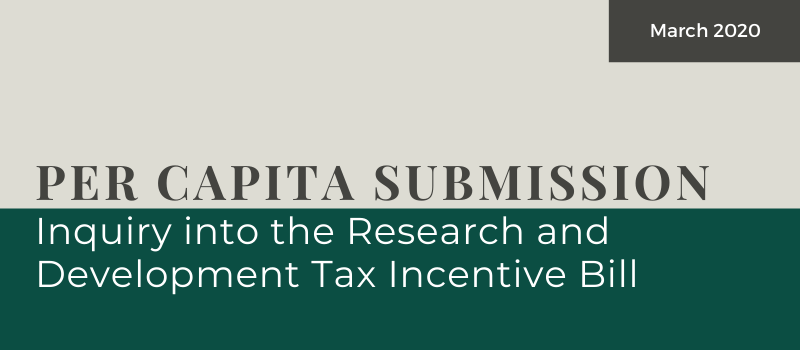Executive Summary
Australia has seen a significant decline in research and development (R&D) spending for over a decade. While most other advanced and middle-income economies are seeking ways to capture gains from the current technological wave by increasing R&D spending, Australia has seen a year on year decline in R&D intensity since 2008. R&D intensity, measured by gross expenditure on R&D as a % of GDP, currently stands at nearly 25% below the OECD average; 1.789% compared to 2.367%.
We are failing to keep up with our global peers, to such an extent that Treasury Deputy Secretary Meghan Quinn in a speech last year warned that Australian industries were slipping behind in the adoption of new digital technologies and superior management skills: “Australian firms have fallen behind firms at the global productivity frontier over recent years”.
It is within this context that the government has, over the last two budgets, cut more than $4 billion from R&D tax incentive scheme in the budget. The Treasury Laws Amendment (Research and Development Tax Incentive) Bill 2019 (the Bill) will reduce spending by another $1.3 billion.
Per Capita believes, alongside the almost uniform response from academia and business representatives, that the Bill is corrosive to our economic position. Such reductions in our R&D assistance schemes are at odds with current trends in other countries, anathema to firms looking to make high value R&D investments, and detrimental to finding a solution to the ongoing productivity slump. The rapidity with which changes are made to R&D funding schemes is particularly challenging for those wishing to invest.
As such Per Capita recommends against passing The Bill.
If Australia is to capture the gains of the ongoing technological revolution and translate those gains into high quality jobs and equitable economic prosperity, we believe a systematic and broad rethink of R&D schemes is required. We go further, making a range of recommendations regarding a broader range of R&D issues.
Recommendations
We propose that the Bill not be passed and that the RDTI be frozen pending a review of R&D support programmes.
Failing this, we support the following measures:
- Disassociate the rebate from the corporate tax rate. Reinstate previous model of 45% for small entities and 43.5% for large entities. This will allow more long-term certainty for companies looking to project R&D spending into the future regardless of changes in tax rates of the government of the day; and
- Remove the tiered incentive component.
However, this Bill fails in its primary object to increase investment in R&D programs that can support a diversification of our export profile and stimulate our economy. We believe that given the persistent low levels of R&D investment from both government and business, the government should immediately instigate a comprehensive review of R&D funding. Such a review would need to take into account direct and indirect funding in both public and private, academic, and business contexts. We also recommend that the government establishes a bi-partisan task force to explore the potential of for an Australian disruptive technology fund.
Additionally, we recommend that the government increases funding streams specifically for start-ups. While the Early Stage Venture Capital Limited Partnership (EVCLP) programme does improve conditions for firms seeking early investment, it is inadequate for making Australia an attractive location for start-ups. We believe that that targeted R&D direct assistance presents an opportunity for the government to assist in the transition high quality jobs in the post-carbon economy.
Similarly, we must reinvest in university research budgets. Government spending on R&D is at an all-time low of 0.5%, following the A$328 million reduction in university research budgets to fund regional education. This compares to an R&D spending high of 0.75% in the early 1990s.
Furthermore, in so far as direct government R&D is concerned, we believe that the imperative to commercialise research should be reduced. During the major economic restructuring required during the transition to a post-carbon economy, it is important to recognise the difficulty of commercialising research. New solutions and innovations may not be incremental but require long-range exploration and thus long- term timelines.
Finally, the government should immediately remove the staffing cap on the CSIRO and substantially increase funding across the board, in order to stimulate and expand the productive capabilities of our premier scientific research institution.

